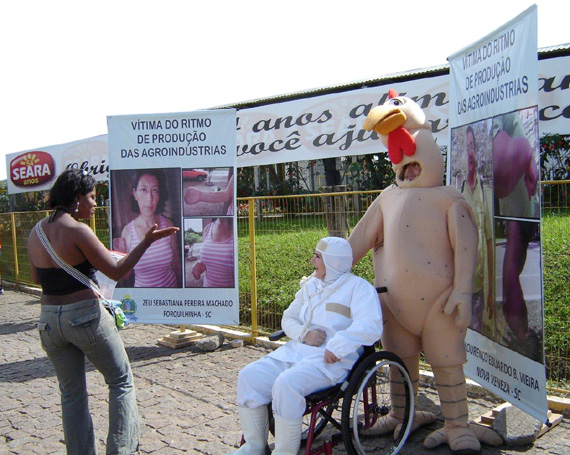|
On April 28 the National
Confederation of Food and Agroindustry Workers (CONTAC) held a number of
mobilizations nationwide, calling for the implementation of a law that will
regulate the work pace in meatpacking plants, with the aim of reducing
occupational illnesses in this sector, which presents a high rate of injured
workers.
For Brazil’s
food industry workers, last April 28 was an opportunity to give even more
visibility to the
National Campaign to Eradicate Occupational Illnesses in Poultry Plants
promoted by CONTAC.
The campaign’s
logo depicting a chicken pushing someone in a wheelchair was seen in every
capital city of Brazil, accompanied by a large group of workers.
This activity
began in 2003 and has been repeated every April 28 with the same level of
success, gathering numerous demonstrators.
This year,
600,000 informative fliers were distributed throughout the country with the
slogan: “We demand a law
to regulate work in meatpacking plants now!”,
and data and figures on the current conditions in the sector in Brazil.
This year’s
mobilizations were held in cities with poultry processing plants with the
specific aim of pressuring the government and the business sector to give
continuity to the drafting of a Law to Regulate work in poultry plants
towards eradicating professional illnesses in the sector.
In 2010, after
several years of joint efforts with the IUF and the implementation of an
international denunciation campaign, CONTAC succeeded in establishing a
Tripartite Committee in the Ministry of Labor with the aim of regulating work in
poultry processing plants. This committee is scheduled to meet on May 5 and 6 in
Sao Paulo to begin drafting the law.
Emphasis will
be made on cutting work hours, through a reduction in the workers’ exposure to
repetitive tasks: for
each hour worked, there will be a ten-minute break.
This is
something the sector’s workers have long been fighting for.
It should be
noted that this CONTAC-IUF campaign on occupational health in the poultry
sector –conducted with the support of Finland’s SEL–SASK– has gained international
visibility, with several European organizations taking an interest.
 |